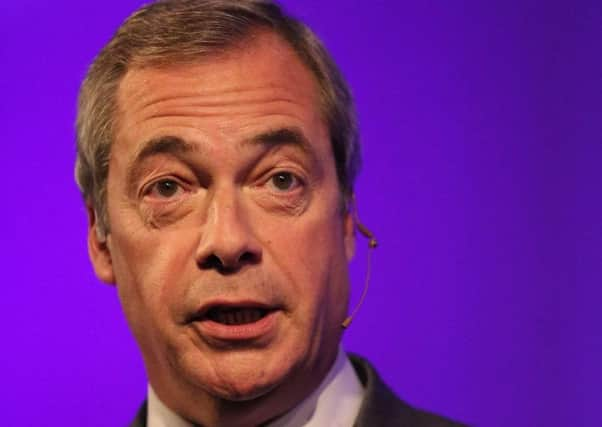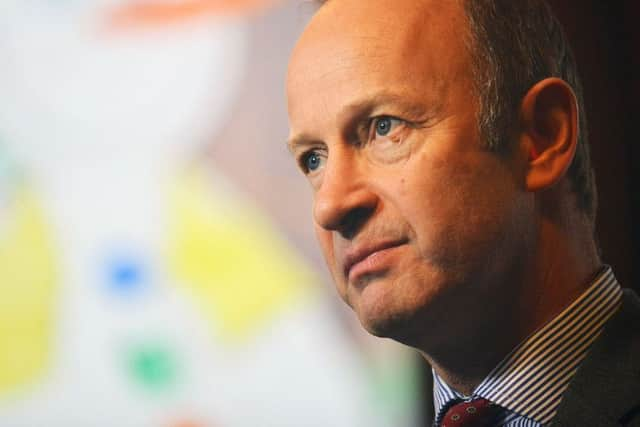Mark Stuart: Only a Nigel Farage comeback can save Ukip from abyss


Taking a longer view, Ukip is but the latest small party to struggle under Britain’s ‘winner-takes-all’ first-past-the-post system. Remember the ill-fated Social Democratic Party (SDP) formed as a breakaway from the Labour Party in 1981? Although they polled well at the 1983 and 1987 general elections in their Alliance with the Liberals, there were no prizes for finishing in second place. By 1990, the SDP was pronounced dead.
A similar fate befell the British National Party (BNP), which did so well in the 2009 European elections, gaining two Members of the European Parliament (MEP) in Yorkshire under a proportional voting system, and yet a year later they were cast into obscurity at the 2010 general election.
Advertisement
Hide AdAdvertisement
Hide AdBut there is more to Ukip’s problems than the injustices of the voting system. Ironically, their moment of greatest triumph – the Leave vote of June 2016 – deprived the party of its unique selling point. Formed as a single issue pressure group in the early 1990s with the express aim of taking Britain out of the EU, Ukip was left without a definitive raison d’etre.


Ever since, Ukip has displayed another perennial tendency among small parties – overreliance on charismatic leaders, in this case Nigel Farage. When Farage announced his retirement after the EU referendum, the party lost its talisman. Although Farage is a Marmite politician, liked and loathed in equal measure, recent research by Matthew Goodwin and Caitlin Milazzo shows that he was the biggest single driver of Ukip’s support.
Bereft of Farage, Ukip elected Diane James to replace him in September 2016, but she only lasted 18 days. Such was the bitter infighting that one Ukip MEP, Steven Woolfe, was taken to hospital when he collapsed following a “scuffle” with Yorkshire MEP Mike Hookem in the European Parliament.
The election of Paul Nuttall in November 2016 failed to reignite Ukip’s fortunes. The hope was that Nuttall’s credentials as a plain-speaking Scouser would appeal to working class Northern Labour voters. However, such hopes were dashed at the disastrous Stoke-on-Trent Central by-election in February last year when Nuttall made false claims about the Hillsborough disaster. His brand was tarnished and he never recovered.
Advertisement
Hide AdAdvertisement
Hide AdUkip reached a low moment at last year’s election when it lost its only seat, in Clacton, after its MP Douglas Carswell, resigned. Worse still, the party lost its key financial backer, the boisterous Arron Banks, meaning it could only field just over half the candidates it had in 2015.


Moreover, the two main political parties ruthlessly targeted Ukip voters. While Theresa May’s Conservatives promised a ‘hard Brexit’ and tough policies on immigration and grammar schools, Jeremy Corbyn’s anti-austerity message appealed to Northern ‘left-behind’ Labour voters.
Struggling for something fresh to say, Ukip’s 2017 manifesto Britain Together came up with brash, in-your-face policies such as banning the burka and slashing the overseas aid budget. Meanwhile, Nuttall came across as aggressive and extreme in the televised leaders’ debates.
On the ground in the constituencies, the organisation continued with its amateur style of campaigning, many of its dwindling band of activists seemingly believing that good campaigning consists of setting up street stalls and giving out balloons rather than producing accurate canvass returns.
Advertisement
Hide AdAdvertisement
Hide AdThe result was that only 600,000 people voted Ukip at the 2017 election compared with nearly four million two years earlier, leading to the resignation of Paul Nuttall, and the election of Henry Bolton, whose leadership has fared little better. His attempts to change the party’s logo to a lion only ended up in accusations that it had been copied from the Premier League’s logo. And more recently, Bolton has become mired in scandal over his personal life and the racist views of his young lover Jo Marney.
Having lost a vote of confidence on Sunday, and facing a string of resignations from his frontbench team, he issued a defiant statement in which he asked party activists to back him over Ukip’s executive.
So what now for Ukip? Casting around for potential leadership candidates, Nigel Farage will be urged to make yet another Vladimir Putin-style comeback.
Much depends on the Brexit negotiations. If, as seems likely, Theresa May is forced to accept a ‘soft Brexit’, it provides room for Farage to re-emerge at the head of a party which cries betrayal.
Advertisement
Hide AdAdvertisement
Hide AdWhat is certain is that under Britain’s cruel first-past-the-post system, small parties need charismatic leaders in order to survive. If Farage doesn’t return to the fold, it won’t be long before the last rites are performed on Ukip.
Mark Stuart is a political academic from York who has written biographies of John Smith and Douglas Hurd.